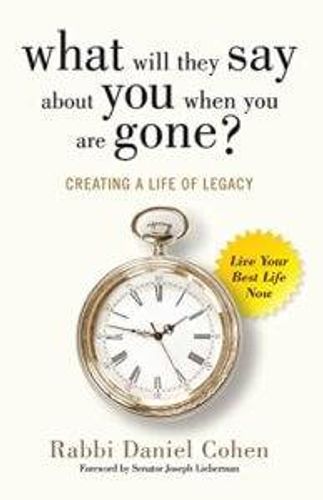How Will They Remember You When You Are Gone?
A rabbi's book offers wisdom on creating your personal legacy
As senior rabbi at Congregation Agudath Sholom in Stamford, Conn., New England’s largest Modern Orthodox synagogue, Daniel Cohen ministers to 575 families. At home, Cohen, 49, shares his wit, wisdom and spiritual insight with his wife, Diane, and their six daughters, who range in age from 13 to 25.
With his engaging book, What Will They Say About You When You Are Gone?: Creating a Life of Legacy, Cohen broadens his audience, offering people of all faiths and traditions a strategy to lead a fulfilling and meaningful life. Step by step, his “Reverse Engineering” process guides readers through envisioning how they want to be remembered, then suggests specific steps to ensure that legacy.
Next Avenue recently spoke with Cohen about his user-friendly approach. Highlights:
Next Avenue: Why is the idea of legacy such a powerful tool for getting people to examine their lives, decisions and direction?
Rabbi Daniel Cohen: Two reasons. One, we are driven by an inner sense that we want to be known and to make a difference. No one wants to feel their lives don’t count; we want to feel we have made an impact. It’s universal, whether you’re a person of faith or no faith. Legacy is an automatic way for people to crystallize the core values they believe, the life they want to lead, the character traits they should aspire to. Legacy wakes people up to not just cruising through life.
The second piece is that as a rabbi, I’ve found it’s often only through a brush with mortality, like when a parent dies, that people confront the reality that our time is limited. They’ll think more about the meaning of life. The idea is to take that universal awakening and motivate people to live with that awareness each and every day.

In your work as a rabbi, what kinds of regrets do you hear most frequently during people’s final days and hours?
'I should have spent more time with family.' 'I was too focused on my job.' 'Wasted time.' Another one people regret is having made expeditious decisions for convenience rather than making a decision that reflected their values. Also, people wish they’d been more forgiving. I’ve spoken to people who will remember there was an argument and won’t remember what the argument was about, yet they’re still holding a grudge.
You offer exercises that help people identify what is truly meaningful to them. My favorite was to list five words you want on your headstone. What’s your favorite exercise?
What values are worth fighting for? What are those things we’re willing to take a risk for that we really believe in and that reflect our deeper values? I sit with people at a funeral and their children will reflect, 'You could always count on them.' When several people say that, it means that the person went outside their comfort zone.
You identify gestures of kindness — what you call 'Elijah moments'— as the most important strategy. Why are these small acts so important?
An Elijah [an Old Testament prophet] moment encourages people to realize that even in the smallest of acts, they can be an ambassador for goodness. In the world today, people are uplifted by these small acts of generosity. When we give someone a smile or buy them coffee, it gives people hope. It makes them realize there’s a lot of goodwill out there.
How do these moments differ from so-called random acts of kindness?
These are not random. They’re intentional. In order to lead a life of legacy, it’s asking yourself at the beginning of the day, 'Who are the five people I’ll touch today?' Or when you walk into the supermarket, asking, 'Whose day can I make brighter?' It takes effort, but it makes us and everyone around us feel good.
You cite many impediments to living an ideal life. Which do you find particularly obstructive?
Habit. When you are with someone in a quiet space and you ask what’s really important, 95 percent of people will give you an answer that reflects their innermost values. Then they walk out the door and get the pressure of an email or an ad, and they forget about those things. To me, the greatest obstacle is not being present and really thinking about how you want to lead your life on a consistent basis.
Next Avenue readers are often 50 and older. Is it too late for them to 'reverse engineer' their lives?
Not at all. Moses began his career at 80, Abraham at 75. One of the most important ideas to remember is that we retire from a job, not from life. We associate ourselves with what we do, but we shouldn’t confuse that with who we are. We can be volunteers, have hobbies, be a mentor.

What would you say to older people who are constrained by physical limitations and see little opportunity for influence or impact?
I just did a funeral for a woman who was 95. Her son said it was only in the later years she began to share details about her life and her wisdom. We can make every day into a masterpiece. When we’re blessed to wake up in the morning, God is saying, 'I believe in you.' There’s still more inside of you to give to the world. It starts with a fundamental belief that we’re not defined by our physical limitations.
Your book appears at a particularly divisive moment in our country’s history. Are you finding applications for its lessons that weren’t on your radar at the time you wrote it?
Yes. One of the main messages is that life will throw obstacles and challenges. The point is to turn those problems into new possibilities. People are spending a lot of time today protesting and yelling at each other. But maybe these are opportunities to create bridges to connect with each other. We’ve gone through tough times in the past, too. It’s inspiring to see people who came out of a time of bitterness and conflict and suffering, like the Holocaust, who feel they can’t change what happened in the past, but can choose to help make the world better today.
Next Avenue Editors Also Recommend:


